Text
Meet Our New Grad Students!
Alyssa Cook
Hi all! I’m a first-year GTA here at K-State in the creative writing track. I went to undergrad. at Saint Joseph’s College in Rensselaer, Indiana, and I’m from a nearby town in the middle of nowhere called Wolcott. I mostly write children’s fiction. I also love fantasy, and that love tends to work its way into my writing in one absurd way or another. Neil Gaiman, Gregory Maguire, and Margaret Atwood are just a few of the authors that have inspired me over the years. I also have an eclectic interest in classic literature (everything from medieval leis to Huckleberry Finn). Outside of school, I love cooking and long-distance running, so if you see me running around campus, I can’t guarantee I’ll say “hi” back, but I’m usually good for a slightly pained smile.
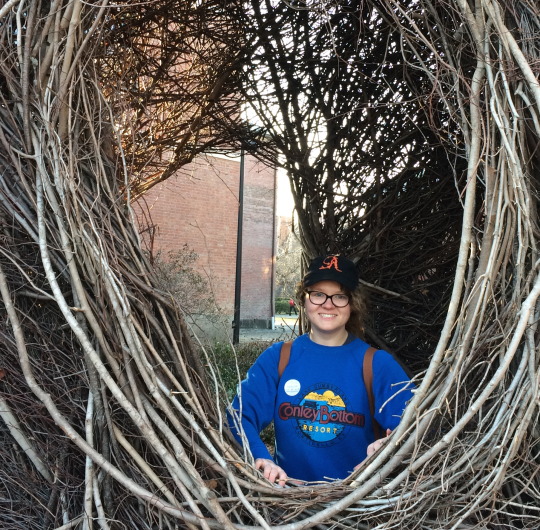
Krista Danielson
Originally from Los Angeles, California, Krista Danielson is delighted to call beautiful Manhattan, Kansas, her new home. Krista's primary genre is Creative Nonfiction, though she has a soft spot for YA Lit and Magical Realism. Before moving to Manhattan, Krista lived in Hamburg, Germany, for seven years, where she taught English to adults and preschoolers, learned about the Bundesliga and breads, and discovered the joy of reading Grimm's fairy tales in the land in which they were written. She received her BA from the University of Colorado, Boulder, and her Teaching Credential from Mills College.
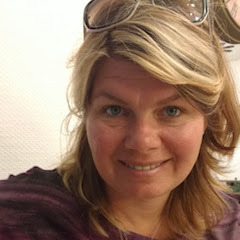
Ryan Ellis
My name is Ryan Ellis, and I am on the creative writing track here at Kansas State University! I graduated from Ottawa University with a B.A. in Communication Studies and English. I love the works of Romantic Era writers, and women writers in general. William Wordsworth, Virginia Woolf, Kate Chopin, and William Blake have my heart. I was born in Kansas City, but I moved to Manhattan on the first day of June with my fiancée and my two moronic cats. My cats are the light of my life, even though they are quite stupid. My excitement to be a part of this department is infinite. I look forward to sharing these two jam-packed years with the incredible faculty and student population of Kansas State University’s English department!
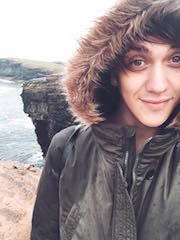
Ryan in Papa Westray, Orkney Islands, May 2016.
Kat Goetting
I'm a first year GTA at KSU. Although most of my undergrad (Fort Hays State) was spent exploring avenues of creative non-fiction, I'm attempting to branch out into fiction as a graduate. I’m currently suffering from travel withdrawal––I studied abroad briefly in the U.K. and ever since I came home I’ve wanted to go back! I love making jewelry and décor, specializing in “upcycled” taxidermy pieces. I sell a good portion via Etsy as well as various craft shows in Lawrence. I have a big collection of specimens, both biological and mineral. I love a good crystal!
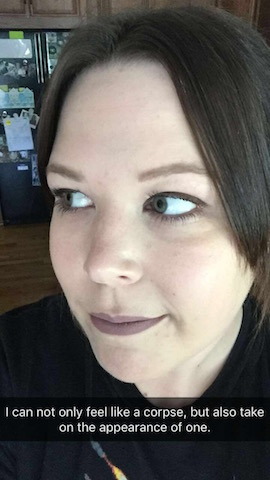
Daniel Haws
I grew up the middle child of three sons in a rural town in Northeast Kansas. I returned to school as a non-traditional student to pursue my passion for the story, and received my B.A. in English from Washburn University in 2015. To explore my love for the diversity of our kind and our shared experiences I taught English in China after graduation. I enjoy films, novels, travel, video and table top games, and swimming. I also very much enjoy cooking for others, both professionally and for my friends and family. As of late I’ve acquired what I perceive as a peculiar desire for home improvement and general lawn care. My father says this is just part of growing old.
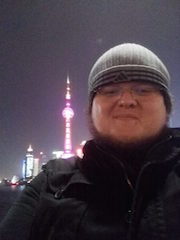
Maddie Pospisil
My name is Maddie Pospisil, and I'm from Omaha, Nebraska. I received my undergraduate degree from Northwest Missouri State University, and I'm looking forward to settling into life as a Kansan (I really, truly love the Midwest). I'm a poet, though my prose poems often blur the line between poetry and creative non-fiction. I write about family, belief, and all the tiny moments I keep in my notepad. Here are some things I am passionate about: equity, feminism, Mad Men, and hot tea.
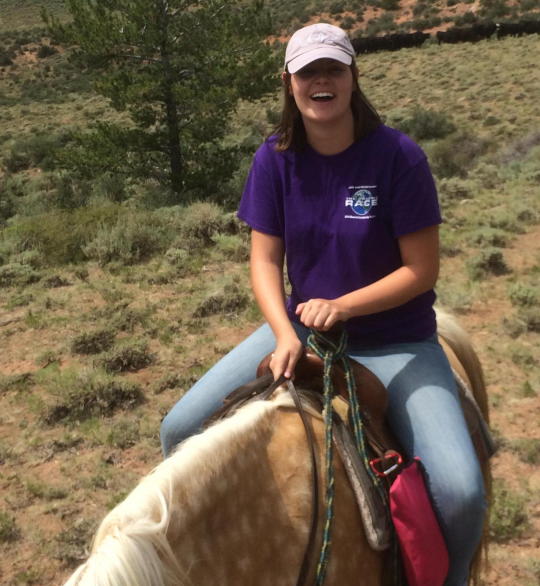
2 notes
·
View notes
Text
K-State Creative Writing Launches Podcast
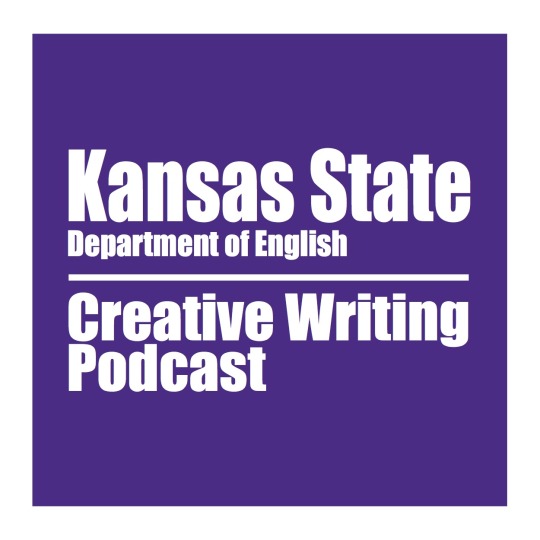
by Hunter Gilson
Nearly all podcasts, from what I can tell, end with some sort of sign-off that thanks the people who helped make that particular episode possible. K-State’s new Creative Writing Podcast, which can be found here, does the same. But before you go off and listen to it, I want to actually flip that script and thank a few people.
Many thanks to the writers that were interviewed for this podcast. From what I can tell, it seems like we keep visiting writers pretty busy when they come to give a reading at K-State—what with all those student conferences, meetings, meals, and, oh yeah, their reading. It’s much appreciated that you all not only carved out an additional hour to conduct an interview but also gave thoughtful responses to our interviewers.
I want to give an added shout out to Elena Passarello, Tom Franklin, and Irina Reyn. It was incredibly generous of them to meet with me, a man with nothing more than an unpublished podcast and a voice recorder, during last year’s AWP. Not only are they great writers, they are also funny, smart, and incredibly kind people, who gave great interviews.
I mentioned this in a previous blog post, but I wouldn’t have even been able to attended 2016’s AWP without the help of the College of Arts and Sciences. To be honest, those three interviews are my favorite out of the sixteen that are published. Without A&S, I would never have been able to afford to go to Los Angeles to conduct those interviews.
Speaking of monetary support, thanks to the Department of English, particularly Dr. Karin Westman. From where I’m standing, Dr. Westman took a chance on something that our department has never tried before. I truly appreciate the continuing faith she has put in this project and its ability to succeed.
Our department is full of smarty-pants, and a lot of them conducted interviews for this podcast. As it turns out, smart people ask smart questions. Some of those people have long since graduated and moved elsewhere but I’m still tremendously grateful for the enthusiasm they showed for our visiting writers’ work and in the interview.
And finally, thank you to Dr. Dan Hoyt. Dan always does a lot for our department and even more for his students. I’d need a series of 4 – 5 blog posts to thank him for the 6 years-worth of awesome advice he’s given me, but I’ll keep it to one thank you for this post. Dan pitched the idea for this podcast to me and let me construct it pretty much on my own. The whole thing took much longer to complete than either of us expected, but he remained committed, especially when I wasn’t, and pushed me to finally finish the dang thing. Without his help, these interviews might have ended up as nothing more than some .mp3 files on a jump drive that I carry around in my messenger bag. Our department gets to share these interviews with the literary world. A lot of that is thanks to Dan.
Turns out that creating a podcast from scratch apparently demands a lot of time. Initially, I figured that it would be as simple as adjusting some levels, slapping an intro and outro onto either end, picking an opening instrumental tune, and uploading that sucker. I’m delusional that way and have a habit of imagining that really hard projects will progress seamlessly, like my Eagle Scout project where some unfortunate family members of mine and I moved 13 tons of pea gravel and shredded rubber on a church’s playground.
It seems only fitting, however, that a podcast about creative writing—an activity that, in my experience, is synonymous with mission creep—would end up demanding a substantial amount of time to revise. I won’t detail what that process entailed, nor will I try to construct an analogy that portrays fiction writing and podcast producing as analogous activities. Quite frankly, after over a year, the only thing I want is to have someone other than me listen to these things.
I’m admittedly as biased as any person could probably be, but even the most cynical side of me thinks that these podcasts have many remarkable moments. I hope you all listen.
So please do. Even if you’re not that that wild about podcast, give them a shot because these ones are good. Listen and listen again. And after you do, consider liking the episodes that you enjoyed and maybe even those you were sort of lukewarm on. Share them. Share the episodes you like with close friends. Share the ones you don’t like as much with your enemies. Blast it out across social media, using as many .gifs and emojis as you’d like, and say that this podcast exists, that these writers are cool, and that writing and talking about writing is even cooler.
And, in advance, thank you for listening.
1 note
·
View note
Text
Manhattan Writers Resist
by Peter Williams
The Writer’s Resist event occurred at Arrow Coffee a few weeks back on January 20, a little later than the rest of the national event in order to avoid an ice storm that, like 60% of our electorate, failed to materialize. Dan Hoyt began the reading with a recitation of the First Amendment. Several readers followed: Elizabeth Dodd read a poem about parcels of severed protest digits. Katy Karlin read an incisive passage from Martin Luther King Jr.’s January 1968 speech in Ahearn Fieldhouse on K-State’s campus. Faculty and students read poetry and prose, each reading expressing concern for the threat to free speech, of the consequences, dangers, and abuses of silencing those who need to be heard.
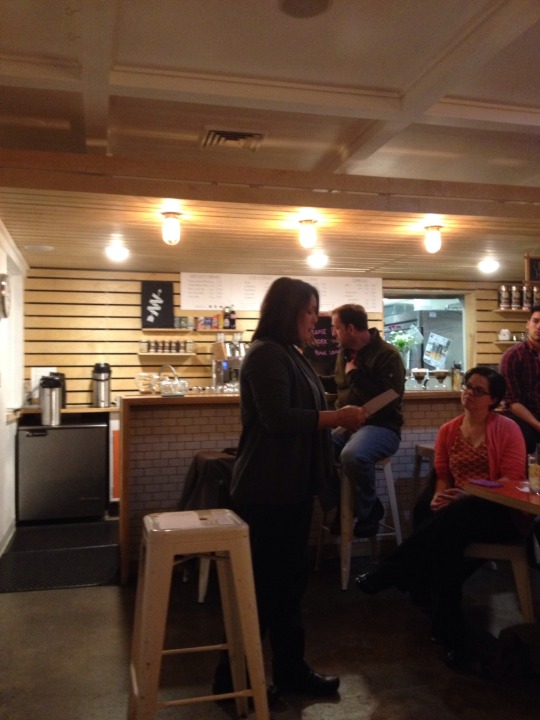
I had, let’s say, a little trouble facing down this task. I took too literally the guideline that we shouldn’t read anything that was anti-anything. “Okay,” I thought. “I will find something in the words of a founding father.” Surely in the foundational writings of our nation there is some hopeful and encouraging bit that both bolsters patriotic feeling and doesn’t dissent? Nope. I was wrong. At least, in that week leading up to the inauguration, I couldn’t find a passage from Jefferson, Madison, or Lincoln that didn’t sound directly rebellious to the current state of things. Even Ben Franklin’s “Description of an Instrument for Taking Down Books from High Shelves” was critical of a man who’s reportedly never been concerned with the contents of a bookshelf.
So in my discouragement I turned to H.L. Mencken, the ever-cynical and provocative early-20th century Baltimore journalist. This was an unproductive move. In his Prejudices, he mentions the inability of political compromise, the inherent self-interest of governing bodies, and even the Russian propagation of “false news” which afflicted American newspapers in the Twenties. These controversies furthered my discouragement. So I just bowed out of the lineup. Yes, I overthought this one.
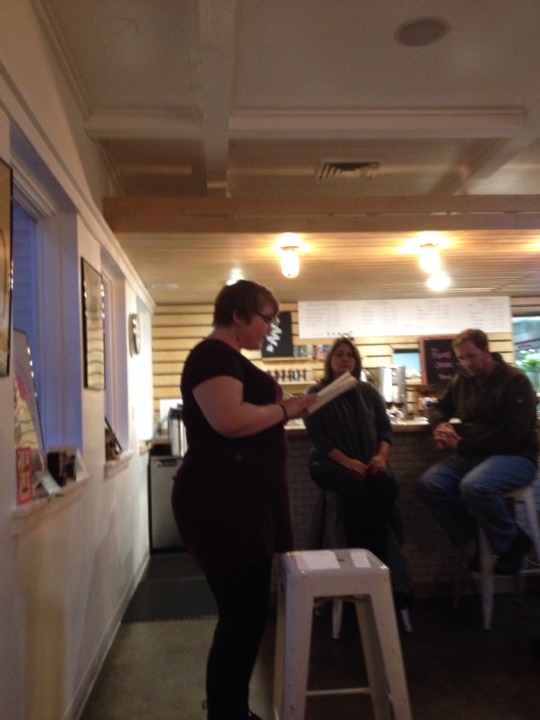
I found during the reading, though, that others weren’t so sheepish as me. Why the title of the event – Writers Resist – didn’t cross my mind, I can’t tell you: resistance is permissible, and more importantly, it is vital.
In 1920, Mencken delighted in mocking the election of Warren G. Harding, a nationalist and an isolationist. This quote pops up before every presidential election and is every bit as cynical and elitist as one would expect. Nonetheless, it’s difficult not to share the sentiment: “As democracy is perfected, the office of president represents, more and more closely, the inner soul of the people. On some great and glorious day the plain folks of the land will reach their heart’s desire at last and the White House will be adorned by a downright moron.”
Peter Williams is a first-year graduate student in the Creative Writing track of the Kansas State English Department.
2 notes
·
View notes
Text
Snowmen and Poetry: Creativity Under Surveillance

by Dylan Pyles
The population of Vandalia, Missouri is 3,899, counting the two thousand or so prisoners living at the Women’s Eastern correctional facility. The town’s lone Chinese restaurant serves the best Crab Rangoon You’ve Ever Eaten. It seems unbelievable, because it is the best. I was introduced to the Myth of the Rangoon on the drive down. The head of the church ministry program, who had arranged for me to teach a one-day workshop in creative writing, said she hoped I like Chinese. As I signed in and we passed through security, it seemed like everyone mentioned the Crab Rangoon, as if it had become a natural component of the atmosphere. I could devote quite a few words to the Rangoon, but perhaps they’re best saved for another day. In short: I was not disappointed. But while indulging, I became aware of an absence—the absence of Crab Rangoon in the lives of my students for the day. The miracle of the best Crab Rangoon You’ve Ever Eaten belongs to an off-limits world just a few miles down the road.
Much like my freshman composition students, the fifty incarcerated women sitting in front of me at the correctional facility were required to be there. Clear plastic cups of instant coffee sat on their desks next to notebooks and pencils. No one in the room knew what to expect, myself included. Someone volunteered to distribute the reading packet I had put together for the workshop, and I second-guessed my selections for the hundredth time that morning. Too complicated? Boring? Triggering in any way? I introduced myself and realized that I had the attention of the entire room. I read Anne Lamott and asked them to look at things like they were looking at them for the first time. They were interested in the opportunity.
When I asked for volunteers to share their list of things they were grateful for, more hands appeared than time would allow. All voices hushed in preparation for each reader, and all eyes watched as the reader’s face illuminated, typically when she was halfway down the page and realized that what she had written was, in fact, a poem.
After the group read a short, intense essay by Joy Castro, I was faced with my first defiance of the day: someone in the back, who hadn’t yet spoken, disagreed with my particular interpretation. “Where are you getting that from?” she asked, and immediately offered her own assessment, which revealed a layer I hadn’t reached in the piece. Maybe she was even more interested than I was.
I had feared that they simply wouldn’t write. I had signed on for four hours of this. What would I do if they wouldn’t write? But each prompt produced better results than the one before, and my initial fear became a joke to me.
After being prompted to churn out a one-page short story in which the main character is keeping a secret, one inmate stood up and shared a brief narrative about building a snowman piece by piece on smoke break, careful to keep her new friend hidden from the guards who might destroy him. She used pebbles for a mouth, old cigarette butts for eyes. Initial laughter gave way to contemplation: what did it mean to create something of your own in a state of constant surveillance?
It made me think about the spaces where I create. In the academic workshop, it’s easy to sideline the practical purposes of creative expression. I confess: I’ve often entertained the thought that maybe creative writing isn’t for everyone. But what I learned that day—what I recovered from a younger, more trusting part of me—is that it is for everyone, and for every place. It has to be, or it isn’t anything at all.
When we came back from the Chinese restaurant, a young inmate talked with us excitedly about the food visit she had coming up in a week. She had been counting down the days. She asked our input on what her family should bring her, and we all agreed that no matter what, they should stop for Crab Rangoon.
After lunch break, I asked my class to write about something interesting that happened in the dining hall. There were especially tasty peanut butter bars that day, an unexpected reprieve, and in that way, they were sort of like me.
Dylan Pyles is a second-year student in the graduate program at Kansas State University.
2 notes
·
View notes
Text
Ave atque vale
For fifteen years, Jay and Barbara Nelson of the Strecker-Nelson Gallery have hosted Poetry on Poyntz, a semi-annual soiree for Manhattan lovers of literature. As the Nelsons prepare for retirement, Kansas State Professor Elizabeth Dodd reports on the final event, and reminisces about Poetry on Poyntz through the years.
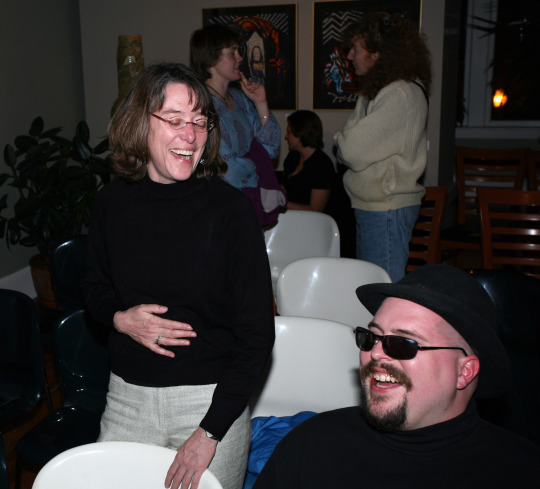
Evenings With Jay And Barbara
Like a magic trick, Poetry (and short prose) on Poyntz emerged from beneath a white-linen tablecloth during a fundraising event at the Beach Museum of Art fifteen years ago.
Or maybe it was spilled across that tablecloth when somebody started waving her hands again.
Or maybe it slipped in the door without actually paying and sat down to eat the piece of Purple Pride cheesecake nobody had touched yet.
Or maybe it leapt from somewhere inside the Chihuly above the staircase, the Medusa-haired, prairie-fire tornado that hangs in its own light, every night, just past the museum’s arch.
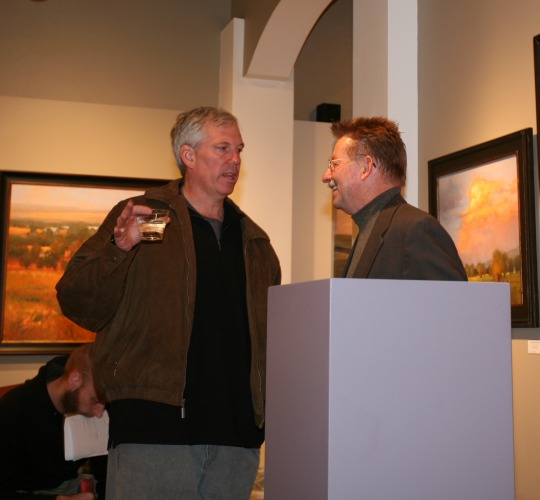
Actually, Jay Nelson seemed to remember exactly what happened. He and Barbara Nelson, his wife and co-owner of the Strecker-Nelson Gallery, had been seated at the same table with me—the two of them conjured up the whole concept: an open mic event for literary artists, hosted in the most beautiful private gallery space between oh, probably St. Louis and Denver. I said yes, yes, please, yes, let’s do it! Ever since, twice a year, writers have gathered at 406 ½ Poyntz (sometimes 406 Poyntz, downstairs), surrounded by work from the region’s most prominent painters, sculptors, and ceramicists, to fill the space with literature, too.
Barbara and Jay’s connection to the English Department goes way back. Jay graduated from K-State with both a BA in English in 1971 and a MA in English in 1973. Barbara graduated with a BA in Social Sciences in 1971. They knew people like Brewster Rogerson, who was honored when alumni established a scholarship in his name. They tell stories of evenings spent in professors’ living rooms, reading Shakespeare aloud, drinking wine and dressed in hippie-wear.
Literature and faces, readers and authors. So they opened the door at the bottom of the stairs and invited us all inside, year after year. And we came.
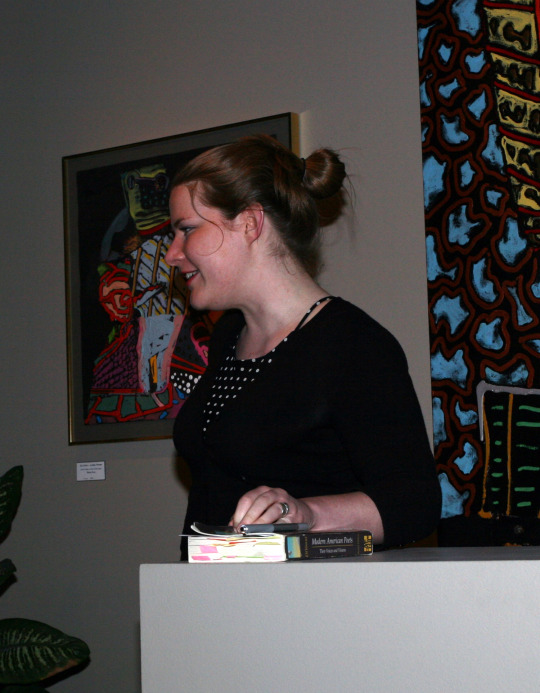
Before he left for KU to chase down a PhD, Ben Cartwright kept showing up with a bullhorn. He didn’t read everything through it, and you couldn’t always tell why he chose to blare the lines he did and skip the others, but it was very cool and even after he left Manhattan, once or twice he came back, dragging the bullhorn with him along I-70 because, well, Lawrence wasn’t cool enough.
Sea Sharp (we knew her then as Cherry Sharp) and Michael Mlekoday performed their poems, spoken with the same back-beat syncopation and driving rhythms that took the stage at Auntie Mae’s Mighty Fine Poetry Night downstairs in Aggieville. (Both poets later collected some of these pieces in their first-published books. We knew them when!)
Erin Billing and Anita (Berg) Mihalic read poems of their own but usually not before cracking the spine of a favorite book and choosing some beloved classic to share. Read someone else’s work along with your own and you’re making the room a portal leading into everything you’ve ever loved.
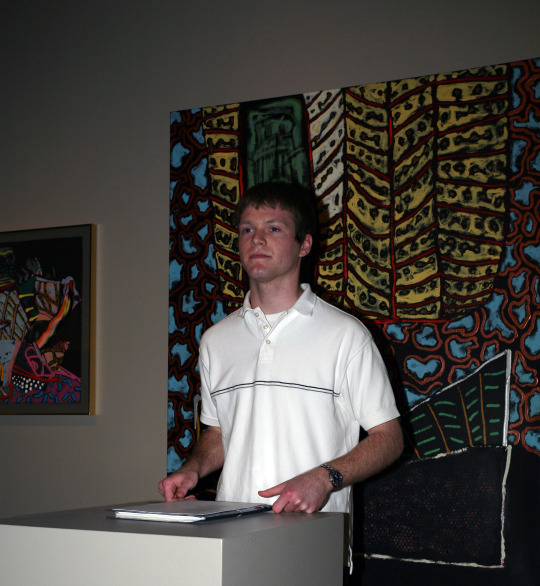
Michael Verschelden broke our hearts with poems of his parents’ cancer, the crystalline fragility of passing time.
Once or twice, the Jabberwock showed up in the person of Rachel Moore who went galumphing back and forth across the floor. And Matt Groneman performed James Brown. James Brown!!!!
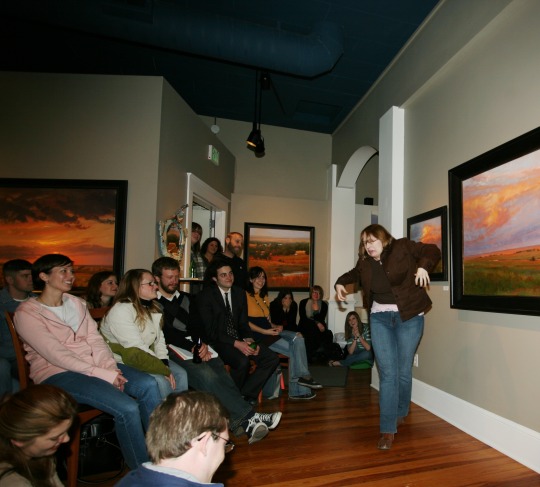
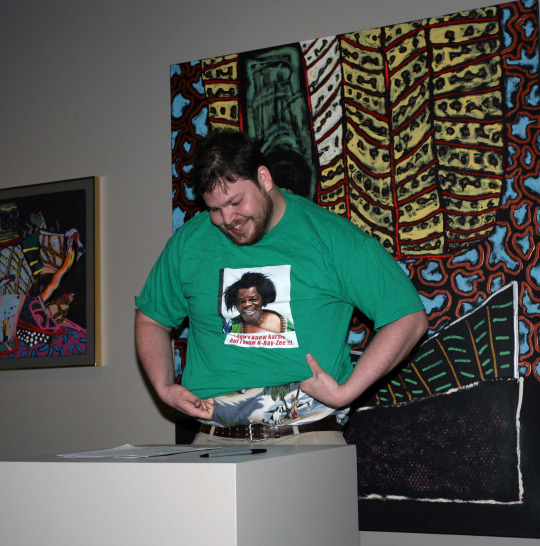
(Then Dan Hoyt flashed his typesetter’s tattoo, asked nicely, and PoP metamorphosed into PaSPoP, which has more letters and looks good on the page but no one can pronounce it.)
People read scenes, paragraphs, dialogue. Peter Williams did that. (And he was really tall.) Cormac Badger did as well, but sometimes he switched to poems and once he Jackie Channed. He verbed.
Kylie Kinley read snippets of essays so funny we thought she would laugh, herself, but she never did. The trip to Italy and the missed train and the beach and the underwear—it all came out joyful and absurd and then someone got up to go the bathroom as soon as the story was over.
Season after season, who gathered in the warm light, drank beer or didn’t, read aloud or didn’t, almost knocked into a piece of art but didn’t. We didn’t think it could ever end: we didn’t.
But last month was the last. The chairs faced west, looking at a painting of a European goldfinch and another of a child in a party hat with ducks flying past the 1950s television set.
Jay stood at the podium, a real podium, antique oak—they’d found it in the alley out behind the building, dragged it in, and for the first time we wouldn’t stand beside the blond-wood pedestals that usually held a wild pitcher morphing into some undiscovered toadstool, or a cross between a teapot and a giraffe. We had a podium. The first time; and the last. Jay told us how the gallery is changing hands: Barbara and he are retiring and have found buyers for the business and the gallery will still be there but there won’t be nights like those again, with the dachshund, Artie, click-click-clicking her toes between the chairs. I wanted to cry.
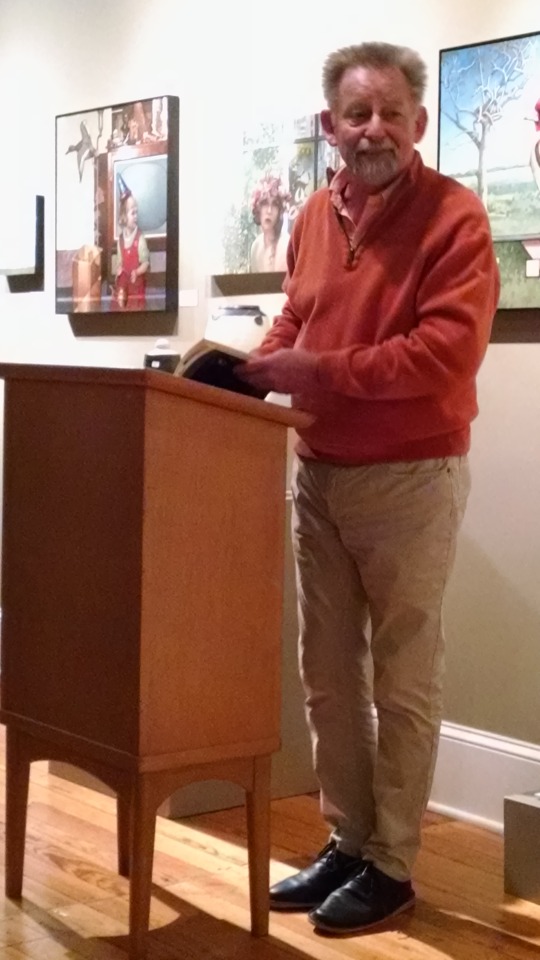
(But I’ve been near tears every day since mid-November, so there’s that.)
Like always, one by one, the readers rose. I used to think it was like a Quaker’s Meeting—stand and speak whenever you’re moved to do so—one after another, coming up front to read from paper printouts, or a notebook, or (how do they DO that??) from their phones.
When Deborah Murray read her sestina, an elegy called “Cowley County Fairgrounds,” she counted out the end rhymes for us like a six-point star—rain, wait, cold, play, darken, wind—and then the poem spread out behind the fingers of her counting hand, a comet’s tail blown back behind its distant orbit.
…down another decade--a bleak and cold
scenario you wish you could rewind,
revise, recast, rather than just wait
for the lingering pain to end, just wait
for her death. This vision is not playful;
it's a vigil. Watching her life wind down,
you see the sky lighten and darken.
But Robert Sanders wound it up again; he read a boxy, prosey, road-wander in Kansas, the story of a highway and a bike, the horizon and the handlebars—ape hangers, he called them, though he held the little podium like a child’s toy between his hands. (“I really liked the biker-dude,” one of my students later told me.)
And Ronald Atkinson read prose as well. “The General’s Address,” his story was called, and he held his paper as if he were outdoors instead of in, as if we sat in the open cold and the wind threatened to lift the general’s speech and carry it away.
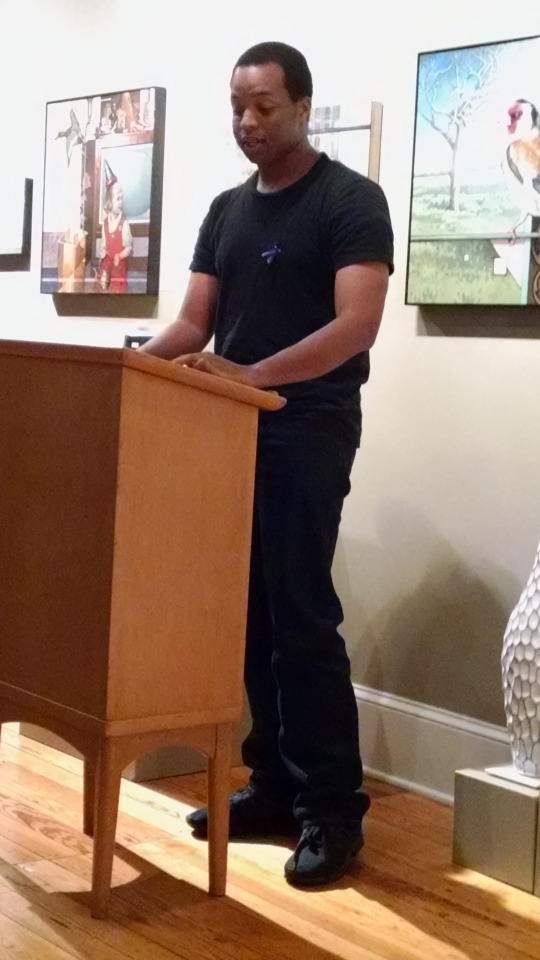
Brian McCarty read what he called ditties. Nope. The characters that stalk his poems will never settle down into anything that bland or dull. Ian Sinnett read what he called poems, and they were, lyric pieces against the foil of narrative.
Brennan Bestwick read his poem “The Howling Rain,” one of his surprisingly surreal intrusions into the heartland, and I remembered at the Farewell Reading, back at Arrow Coffee, Robert booming at him from across the room READ THEM LOUDLY, BRENNAN, and him answering I WILL DO THAT, ROBERT, but that was another time and place.
Katy Karlin thanked our hosts. Ladies and Gentlemen! But for the moment she wasn’t Dr. Karlin, she wasn’t Katy at all: She became James Joyce’s Gabriel giving his formal toast at a party in Anglo-philic, high society Dublin. Ladies and Gentlemen. It is not the first time that we have gathered together under this hospitable roof…
It was not the first time.
Barbara Nelson read us “Summer Evening,” a prose-poem or a tiny memoir by Carolyn Miller, from her favorite journal, The Sun.
Nothing has happened to me yet: not baptism, adolescence, going away to college. I have not managed to slip away from this place forever….and as the sky outside grows darker, the lights of passing cars and the windows in the other houses on the hill grow brighter, until the lights go off one by one, and we fall asleep, not knowing that someday none of us will be able to return, not even a moment, to tell each other what it meant that we were once here together, and alive.
And I realized, this is how I’ll always remember Poetry and Short Prose on Poyntz:
First, a mosaic of faces and sentences, each individual and episodic, each abstracted from the general joy.
Next, the long, suspended moment, the magical hour that stretches, sometimes, well beyond an hour, those floor-to-ceiling windows and a familiar, elevated view.
0 notes
Text
On Writing and Parenting
by Shelby Palmer
As a graduate student, a teacher, and a single mother of two, writing always seemed like something I could do tomorrow. No time today! I have to read three articles and write a response paper by tomorrow. Tomorrow’s no good either. My son’s Parent Teacher Conference is at 4:00, and the dirty laundry is going to claim its own zip code soon. Maybe this weekend. Or rather, not this weekend, because I have to read a novel and grade thirty papers by Monday, and I promised the kids I would take them to the park. Next week. Or possibly the week after.
This isn’t to say that I didn’t get any writing done. The glorious thing about taking writing classes is the built-in deadlines. I have to write this now because it’s due in a week. However, I knew that what I had produced was not my best work. Writing had become homework, something I had to do rather than what I wanted. No time to play with that idea for a short essay about why I hate squirrels; I need to revise my story about the woman with amnesia.

It wasn’t until this past summer break that I realized how bad my habit of not writing had become. Faced with three months of no homework and no teaching, I imagined endless hours of putting words on paper. I would pull meaning out of anecdotes from childhood and search for answers to “what if” questions in more speculative pieces. I could submit to literary journals and maybe even publish. By mid-August, however, I had only accomplished spending time with my kids (always a good thing) and a longer viewing history on my Netflix account (not as good). I had neglected my writing for so long that the freedom from deadlines only worsened my—be honest—laziness. I was not a writer. I was a wannabe.
And then I received some very wise advice from one of my professors at the beginning of this semester. “Writing is your job,” she said to our class. “If you don’t go to your job every day, you get fired. So treat writing like a job.” I’d heard similar advice before, like “make time to write every day” and that sort of thing. But the idea of writing being a job—and that I wasn’t doing my job if I wasn’t writing—clicked in a way that other advice never had.
She did something else that no one ever had before when encouraging me to write more often; she asked us to all make a specific pledge to her of exactly how much we would write every day and the time of day we would do it. Faced with the usual deluge of homework and parenting responsibilities, I could only commit to half an hour each night after putting my kids to bed, which seemed paltry compared to other writers. I heard Stephen King say in an interview once that he shoots for at least six pages per day. Still, I felt encouraged. I already spent at least half an hour every evening reading Facebook posts and watching funny YouTube videos, so surely I could re-purpose that time to do something I actually cared about.
A week after I made that pledge, she checked in on us, and I had to admit that I had failed. The first night had gone well, and I had written for an extra fifteen minutes on a piece that eventually became my first short story for her class. But the rest of the week, I had resorted to my usual routine of not writing. I started making excuses in my head to justify why I hadn’t written. My daughter got out of bed six times and threw a fifteen-minute-long tantrum on Thursday, so I was too distracted to write. I don’t do homework on Fridays as a general rule to keep my sanity intact. And Sunday night, I’d had a stack of reading I had to get done for class on Monday. But ultimately, I couldn’t fool myself with my excuses. I had failed because I had prioritized everything else above my writing.
So I tried again. And some nights, I hated it. I sat at my computer struggling to type six words per minute, waiting for my half-hour to finally be over, discarding my attempts immediately afterward, and pretending they’d never existed. Other nights, the words flowed more easily, and I was so pleased with what I’d written that I revised and cultivated them into something worth submitting. Each week, she checked in with us to see how we were doing with our writing, and each week I was honest about how things went. She held me accountable on a recurring basis in a way no one else ever had, and I developed a habit that I still continue months later.
Sure, life still happens. I get behind on my grading and have to stay up until midnight finishing the stack; no writing today. My daughter is running a fever and needs cuddles before she falls asleep; maybe I can do an hour tomorrow instead. My fiancé is visiting from St. Louis, and I haven’t seen him in over a month; I’m taking the weekend off. But these interruptions don’t derail me, and I force myself—even when I’m not feeling like it, and even when I feel like I have nothing to write about—to start up again, get back in the habit, and keep going. I hold myself accountable now, and of all the job titles I currently have—“mother,” “student,” “teacher”—I can now truly add “writer” to that list.
Shelby Palmer is a second-year graduate student at Kansas State.
0 notes
Text
Friendly Reminder: Writing Should Be Fun
by Brian McCarty
One of the more memorable moments from last summer’s Young Writers’ Workshop involved sitting cross-legged on the floor of the Beach Museum, and listening as middle-schoolers analyzed a Roger Shimomura painting depicting the hardships of Japanese-American citizens who were interned during World War II. As hand after hand went up, each observation made me consider the painting from a different perspective. A powerful representation of struggle and perseverance assumed new layers of meaning. Looking became a creative act, synonymous with interpretation. The importance of being receptive to sight (and the other senses), to language, and to feedback would be emphasized repeatedly throughout the week.
Last summer marked my second consecutive year as an instructor at the Young Writers’ Workshop, a week-long program for local middle-school students sponsored by the Kansas State English Department. The enthusiasm and creativity of the young authors reaffirmed for me the value of the workshop experience, how it reveals new approaches and ideas, and how it forges a community of writers.
There is a public image of writers as angsty, esoterically-minded eccentrics who shun society as they seek that elusive next burst of inspiration. When inspiration does arrive, the result is a verbal gem, already perfect, one that peddles abstractions in the way that pawn shops hawk cubic zirconium. Maybe we can blame the Confessional poets, their dour faces staring at us from the existential chiaroscuros of the 1960s. Or perhaps it’s the idea of Jack Kerouac hunched over his typewriter, improvising paragraph after paragraph of immaculately jazzy prose, chronicling the vain attempts to establish authenticity in the age of the commodity. Regardless, many of us have likely witnessed authors at poetry readings who take the stage and announce their latest creation, written on the back of a napkin or on their way to the reading, or on the way from their seat to the stage. It’s no coincidence that the end result, even if chock-full of interesting ideas, tends to sound exactly like scribbles on a napkin.
In other words, the tortured Romantic genius is a myth. The great writers tend to emerge from communities of talented artists who adhere to similar aesthetics, agendas, or philosophies. Even the Beats, Romantics, and Confessional poets weren’t lone wolves. Also, writing is a painstaking, but rewarding, process, one at odds with the anguish of inspired bards baring their souls.
This past summer’s Young Writers’ Workshop at Kansas State University thoroughly dispelled all of the popular misconceptions about writers and the writing process. Going into this year’s workshop, I was aware from past experience of the extent to which the week’s combination of activities, creative prompts, and instruction could benefit writers whose talent and creativity never ceased to amaze. These exercises were designed to alert these young writers to important truths that many of us didn’t learn until we reached college: that, rather than high-flying, seat-of-your-pants adventure, a successful story proceeds from the conflict generated from flesh-and-blood characters; and that the raw materials of poems exist all around us, even in advertisements and emojis. Being a successful writer depends in large part on being attuned to the world around us. Rather than making grandiose statements about the meaning of life, take the materials and experiences around you and, as Ezra Pound urged, make them new. Even Ralph Waldo Emerson, the grand poobah of Romantics, argued that the universal reveals itself through the experiences of the individual. In other words, it’s through the particular that the larger truths will emerge.
The greatest joy of participating in this workshop, other than getting to know these young authors, was seeing how they transformed the various prompts and materials that the instructors provided into wildly creative inventions. These activities often encouraged them to engage with paintings in the gallery. For one of these prompts, they used a caption from a Shimomura painting as a jumping-off point for a story. His paintings, which included scenes such as a child in cowboy apparel playing behind a barbed wire fence, provided a concrete foundation upon which students could explore themes of despair and resolve. Students were also provided with a number of videos that combined first-hand accounts and archival footage to supplement their understanding of the injustices experienced by the internees.
Other prompts challenged students to devise poems or stories from materials provided by the instructors, including texts such as newspaper and magazine articles, as well as objects ranging from the mundane to the bizarre. In the found poetry exercise, they browsed through various texts, underlining or cutting out words and phrases that resonated due to meaning or sound. This exercise is a great way of getting writers to pay attention to and think about word selection, which is important to achieving compression in poetry. While the poetry activity focused on language, the narrative activity challenged the young authors to incorporate an unexpected plot twist into a story they had recently started. At the beginning of the exercise, each author selected an object they felt could serve as the basis for a story. Once their stories started to take shape, they were provided with a second, drastically different object, one that would alter the current path of their narrative.
The young writers also steered activities prepared by our visiting authors in wildly unexpected directions, whether drafting dramatic dialogues or composing surrealistic song lyrics.
Such activities challenge young writers to be alert to the creative possibilities inherent in the objects, situations, and language encountered on a daily basis—inspiration never exists elsewhere. The opportunity to receive constructive feedback from peers and revise their works throughout the week in anticipation of the final reading also allowed them to experience crucial aspects of the writing process. As opposed to the Romantic notions that champion inspiration, the most important component of writing is persistence. After all, writing is a process. As a group leader, I watched as drafts of stories and poems—some inspired by paintings in the gallery, others resulting from writing activities—morphed into drafts of which the author were truly proud. I know that I was proud of them.
Overall, this past summer once again confirmed the importance of workshops, and the importance of a creative community; perhaps more importantly, it reminded me that writing should be fun.
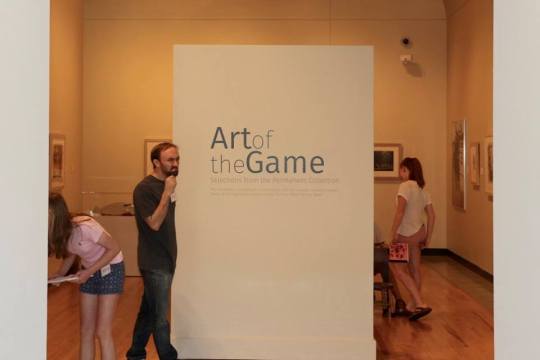
Author Brian McCarty ponders the meaning of life, as Young Writers’ Workshop participants explore the Beach Museum.
0 notes
Text
Good Writers, Good People
by Kira Frank
Last week, I was lucky enough to meet Jerry Gabriel for a manuscript reading while he was visiting K-State alongside his wife, poet Karen Anderson. I never know what to expect with writers. Sometimes they’re persnickety or not at all as cool or insightful as the words they carefully craft on paper. I also make the mistake of putting writers (and artists in general, really) on a pedestal, beyond my realm of understanding and, in worse case scenarios, my powers of conversation. But Jerry was friendly and laid back and wanted to hear about my background before delving into his comments. Something about the earnest question to get to know me changed the dynamic, dissolved my nerves. Even though my story was just barely a second draft, and needed some serious revision, he took my writing seriously—he took me seriously as a writer—and I should, too.
“I usually know people better before discussing their work,” he said.

Once I told him about myself, he asked about the story. What was my process? What was I trying to achieve? When I confessed that I’d stolen more than usual from reality, he didn’t seem surprised.
His advice was kind and constructive, the best balance between encouraging and realistic. While he’d written marginal comments throughout my story, his critiques came mostly out of conversation. He didn’t read out what he’d written. Instead, we talked about what worked and what didn’t. My main character, as it turns out, was a blank slate.
“I struggled with that in grad school, too,” he said. A problem to work on, but not one to freak out about.
We decided eventually that the tense wasn’t working. Too present for any meaningful reflection. “Sounds like a lot of work,” I said.
“I guess that’s the bad news I’m here to deliver,” he said, and I don’t think he was just talking about the story. Writing is difficult, but valuable, work.
Later that day, Jerry read from his book, The Let Go, and his wife, Karen, read selected poems from her book, Receipt. After reading, they stood on either side of the podium waiting for questions from the audience.
I couldn’t resist. “Do you edit each other’s work?”
They grinned, looked at each other, shook their heads. “That doesn’t work too well. No.”
On to the next question, a query to Karen regarding her favorite weeds in the garden she visited. We learned how much Karen loves to dig deep into an obsession and let it manifest in her poems, from vermin (weeds and rats) to receipts (a humiliating experience because we’re taught to avoid discussing money). Jerry explained his most recent work in progress and how the journey of historical research differs from his previous writing process.
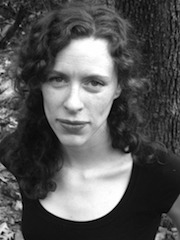
It was a delightful talk, and an interesting one. We didn’t just talk about writing. We learned about how writing intersects with life. After all, Anderson and Gabriel are married with children. For me, it was an optimistic talk with an uplifting message: Look! You can write and get married and have a family and travel around the country to read your work!
Good writers are not always good people. Just like anyone else, they are sometimes boring, or mean, or strange in unappealing ways. Jerry Gabriel is good people. Karen Anderson, too.
Bio:
Kira Frank is a second year MA student at K-State. When she’s not writing, she enjoys singing in public spaces and crafting the perfect pun.
2 notes
·
View notes
Text
Tangled Roots: Teaching Where You Are From
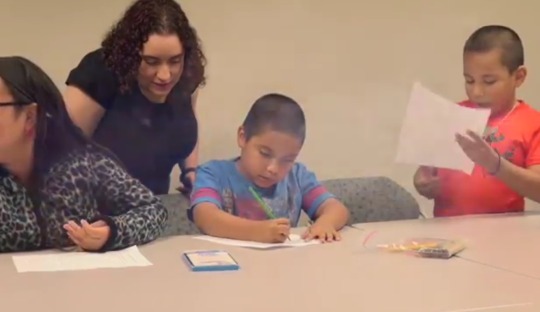
by Minadora Macheret
So a poet walks into a 4-H office…which sounds like the beginning of a bad joke. But, in all honesty, I was fortunate enough to have worked within a 4-H office for the past year, here at KSU. Now, you might wonder how a poet can work in 4-H? Well, poetry (or any mode of writing) has the ability to live in any profession, like blending colors you find ways to sneak creativity into newsletters, workshops, and group meetings. Thankfully, I was given the opportunity to utilize poetry to create culturally-sensitive programming alongside running and creating a bilingual/bicultural poetry workshop for the Verde Clovers of Riley County 4-H.
I was asked to build a bilingual/bicultural poetry workshop for children ages 5-15, which at first seemed very daunting. How do you manage a group of children of various cultures, ages, and languages while asking them to write a poem? Or, hell, ask them to write in their native tongue? A language they were ask to forget. So, I thought about my own experience of being multilingual, of the way I construct sentences, shape new words, or push to create an image that doesn’t quite fit the English tongue. Mostly between the ages of 5-10 I wrote about pandas and popcorn with the occasional Russian word slipping in when I forgot how to translate it to English. I dug deep into my roots as I grew older and wanted to show these children how blending and creating language, using words solely spoken at home, or experiences that were different from others was safe. Was something you could talk about in a poem. So, I used George Ella Lyon’s “Where I’m From…” template to encourage the children to talk about Kansas, their families, language, and everything that made up their DNA. Most importantly, I encouraged them to celebrate and not hide who they are as (unfortunately) some of the children were taught.
On the day of the workshop, I had been running madly around campus making copies of the workshop materials, making sure there were snacks (hungry kids are not to be messed with), and making sure that all the kids knew I or the other bicultural intern would be picking them up. As each child was strapped into the car, they nervously babbled about their days and kept asking if they would really have to write a poem. I just smiled at them and reminded them this workshop was about having fun and learning something about ourselves. As is normal with non-Anglo-Saxon time orientation, the workshop started half an hour later than scheduled as all the kids were corralled into an auditorium-like room in the Manhattan Public Library. We started the workshop by each introducing ourselves and sharing what we thought of when we heard the word Kansas. The 4-Hers were squealing with laughter and energy as answers ranged from “the Konza, my parents’ house, to bad press and tornadoes”. After the kids had gotten most of the giggling out of their systems, I explained to them what sort of poems we were writing and how this particular format of the “Where I’m From” poem is more of a suggestion of what could go on each line, but ultimately, it was up to them. Some of the kids dug right in, ready to talk about themselves as Kansan, as Californian, as Mexican-American while others used markers to trace their hands and drew pictures representing who they were. Overall, the event was a success when I was being asked repeatedly if this would be a monthly event for them to attend. They didn’t know they could write poems, they didn’t know they could write something and that it would matter. What I didn’t expect from working with these kids, who laughed and engaged the exercise with such excitement, was how it would impact my own writing.
Growing up surrounded by stories in multiple languages from Russian to English to Hebrew to Spanish there was never a loss of words in our home. Honestly, I felt like I had too many to choose from or could write a sentence in English using another language’s grammar. To my ears it sounded correct, but not for others. I lived in a world of constant translation, code-switching, and attempting to find meaning, which made writing difficult for me whether that was poetry or scholarly work. Working with the Verde Clovers I was reminded to trust myself and the words I chose to write. Along with trust, they were fearless in the images they created like “I’m from the green house with the yellow mantel / the faces of my family / and Mary and Church” when describing themselves and something familiar they grew up with. It reminded me to take my tangled roots, cast them in front of me, and find each intersection of language and culture as a springboard for my writing, to tackle the trauma and joys of my family that were often referenced through a recipe, a specific meal, the color of my little brother’s hair, and how I was taught to build castles around each memory, to preserve it because you never know when you might need it. Though some of my writing may not have an American audience, there is still an audience willing and able to accept someone who follows their strangeness and the words that make up their bodies, their homes, and the universe they were born into.
Watch video of Minadora’s poetry lesson!
https://drive.google.com/file/d/0B2ffrMdU13RzS0dSWjdZcWV0dkE/view
1 note
·
View note
Text
All That Joy: A Visit with Ross Gay
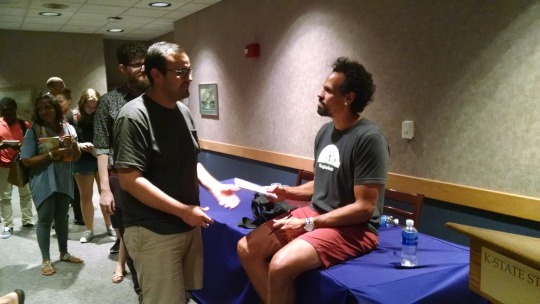
Poet and essayist Ross Gay signs books for Kansas State students
(photo by Elizabeth Dodd)
By Judson Packard
Ross Gay caught me off guard three times today. To be clear, I spent most of my day either in a room with him or preparing a room for him, he had plenty of time to do it. The first time was right when I saw him. He's very tall. Athlete tall. Need-to-talk-about-it tall. Comments-from-strangers tall. It's stupid, but when I'm reading I don't picture many writers as tall. I'm not the only one. To quote the writer Rivka Galchen. “That man who picked us up didn't look like a writer,... He was so tall. Like a lawyer, or a businessman.” So when I saw Ross Gay walking down the street one head higher than everyone else, it was more than I had expected, to say the least. His smile was ripped right from the back of his book (like the flier that's been around campus all week). It was just much higher than expected.
The second time he caught me off guard was something about his personality. He's SO personal. I asked him to sign my book--at this point we had eaten lunch together and talked one on one for maybe two minutes--and he wrote a several sentence-long personal inscription. A good deal of our conference about some of my poems turned in to a discussion of some very personal topics. Before giving any notes, he needed to draw out the meaning I had wanted to put behind the words, to discover what need I had been fulfilling while I was writing the poems.
At the end of his public reading, I watched him engage in almost intimate moments with every person who came up to talk to him. Even with the people he called on to ask questions, it seemed more like a discussion between friends than a question-and-answer session. Ross manages to intertwine his blend of personality, knowledge, and personal experience to project this same intimacy in his writing: “Philadelphia a city like most/which has murdered its own/people/this is true/we are feeding each other/from a tree/at the corner of Christian and 9th/strangers maybe/never again” (From To the Fig Tree on 9th and Christian). He's honest in a way that brings beauty to the everyday. While this is something I've heard said about writers’ work, this is not how I picture the writer's personality. While I don't think I personally fit the mould of the socially awkward writer who communicates better through written word than spoken, I definitely don't hold a candle to the light that shines every time Ross opens his mouth to speak. It's intimidating--in the most comfortable way imaginable.
The third time he caught me off guard was during his reading. It wasn't the essays that I didn't know existed, or the honest asides, or even the number of times he cursed, or the amusing and open discussion of the twisted worlds our dreams pull us through. It was his joy. Hearing his poems read out loud was a delight, not just because the language is beautiful--which it is, head-turningly beautiful--but his readings totally changed my understandings of poems. The dark moments, the low moments, the moments of sadness still carried their weight (I think his poem Feet took the breath out of the room with the lines “But do you really think I'm talking about feet?/Of course she's dead: Tina was her name, of leukemia: so I heard-/why else would I try sadly to make music of her unremarkable kindness?”), but what I had not anticipated was how big all that joy was. Writing, for me, is not a place I usually express my happiest moments. This semester I gave myself the goal of trying to write a happy story and then promptly turned around and wrote 14 pages about suicide. Ross kept the room full of laughs and smiles, in a way that highlighted the somber moments of his poems, which are already hard hitting. After reading all three of his books, I still never saw that coming.
0 notes
Text
Welcome to our new creative writers!
Maia Carlson
Hello! I'm Maia Carlson, first-year grad student who graduated in December 2015 from K-State's biology department and somehow found my way here. I've lived in Norton, Kansas, for almost twenty years now, but my passport still says “Canadian citizen,” a status that makes travel interesting and paperwork extra confusing. I got an English minor largely by accident in my undergrad, and it only took me 4 1/2 years to realize that maybe I should have been writing all along - especially considering my rampant interest in reading high fantasy and writing the same. I self-published ten books before entering college and once since. Don't look me up: my writing has improved drastically (I hope) since then, although my eleventh book is a coloring book, and possibly worth a gander, since my hobby is drawing.
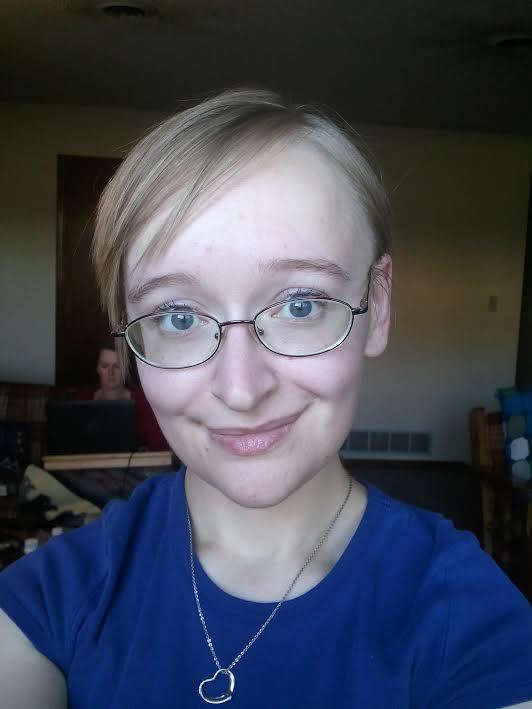
Gavin Colton
Hi everyone! I'm a first year GTA and my track is in creative writing. I received my undergraduate degree in Journalism from Northern Kentucky University, which is just a few miles from downtown Cincinnati - not the NKY that I expected moving here. I'm originally moved to the U.S. from Ireland to pursue both my academic career and athletic career playing soccer. My primary writing focus is in non-fiction, though I do enjoy writing both fiction and poetry. As far as personal reading goes, I enjoy anything Mitch Albom, though my interest in writing non-fiction has led me to some great CNF writers like Ted Conover and Sam Quinones. Some of my other hobbies include playing guitar, hiking, kayaking, cycling, and singing - all of which I'm awful at! I enjoy some good home-style food and well-poured Guinness. Coming to Kansas, I sadly gave up my two cats for the next year or so. Heartbreaking.
In these summer months, you'll see me riding my bicycle to and from campus, sweating, cursing, and maybe even singing out loud. Feel free to splash some water on me as you drive by - I won't be upset! On weekend mornings during fall and spring, you can find me at your local establishment watching some English Premier League games. I'm a big Arsenal fan, beware. I've travelled much of the U.S. east of Kansas, but I'm hoping to continue west and am always looking for a good road trip partner. That, and I don't own a car!
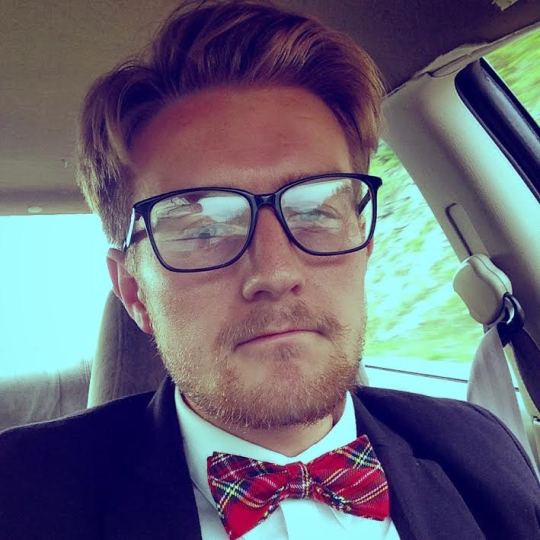
Megan Saunders
Hello, English faculty and fellow grad students! My name is Megan Saunders, and this is my first foray into graduate work. I graduated from K-State in 2009 with a B.A. in journalism and a minor in English. After graduating, I worked at Junction City's newspaper, The Daily Union, for about a year and a half as an education/county government reporter. For the last five years, I have worked as a marketing writer in K-State's Division of Communications and Marketing, helping craft the recruitment pieces that flood high school students' mailboxes each year.
On a personal level, I'm from Spearville, an eensy town in western Kansas that is famous for its vast windmill collection, but I've lived in Manhattan for the last 10 years. My husband, Cory, and I will celebrate four years of marriage this month. The brightest part of our lives is Annabelle, our almost 1-year-old (!!!), followed closely by our black lab, Clyde, and our calico cat, Dubs.
I've wanted to return to school for quite some time, as creative writing has always been an underutilized passion of mine. My goal is to become a better all-around writer (even in regards to recruitment brochures), as well as to reignite my love of creative writing. I'll be taking a slightly different path than many of my fellow students, as I will be working full time and taking a class each semester, but I look forward to meeting and working with many of you in the coming years. Please bear with me as I awkwardly transition from AP Style to MLA, and best of luck to you all!
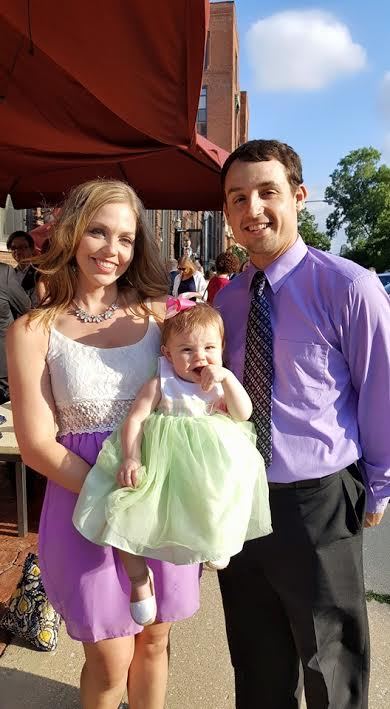
Christopher Stanulonis
Greetings, my name is Christopher Stanulonis, and I am from Waco, Texas, though I was born in Pennsylvania. Out of the numerous genres, my favorite to write is fantasy and, more specifically, Tolkienian fantasy at that. To that end, I have been writing a fantasy epic for 8 years now and know that it will be many more years before I am willing to publish it.
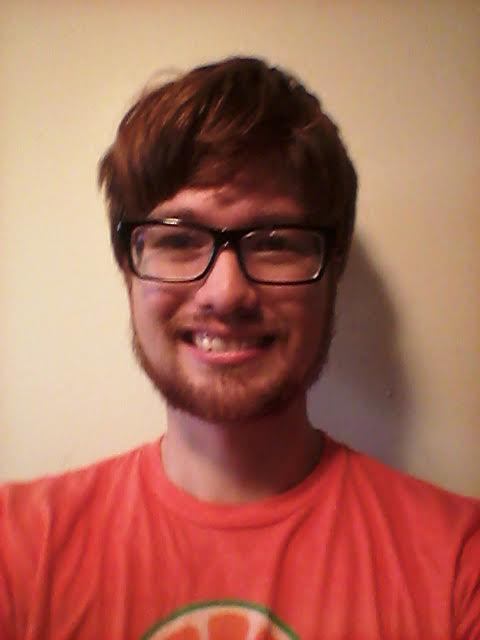
Peter Williams
My name is Peter Williams. I received my undergraduate degree at KSU in English Creative Writing. I'm from Olathe, Kansas. Besides trying to do justice by midwesterners by writing stories about them, I watch movies (anything starring Gene Kelly or directed by Susanne Bier), read (Abraham Vergese's Cutting For Stone is my most recent favorite), and cook (oysters are on my mind right now though they don't take much cooking). Whiskey is good too.
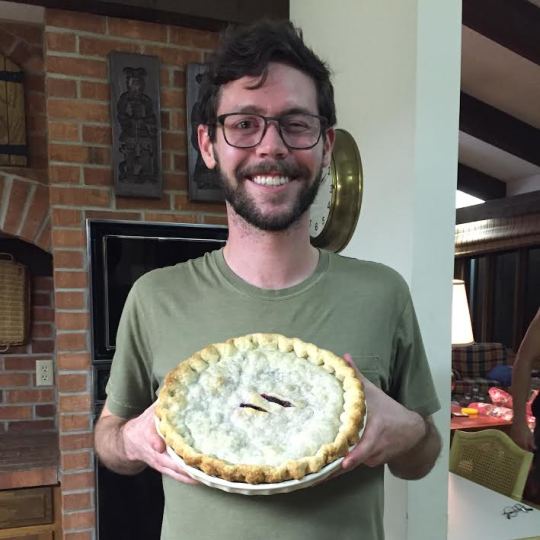
0 notes
Text
Happy summer to all
The K-State Creative Writing blog will be on hiatus for Kansas State’s summer break. We wish everyone a happy summer — with lots of pages to read and lots of pages to write.
0 notes
Text
K-State writers’ summer reading lists
Today’s the penultimate day of classes for the spring of 2017, which means summer is almost in sight — sure, sure, there’s that little obstacle known as Finals Week, but you’re ready. You’ve got this.
And after that, the real reading can begin. Here’s what’s at the top of the summer reading list for various members of the K-State creative writing community.
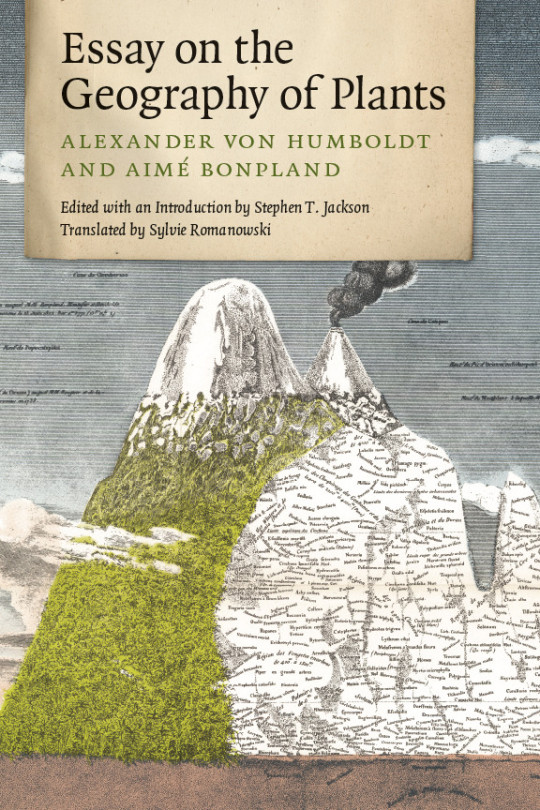
University Distinguished Professor Elizabeth Dodd:
Alexander Von Humbodlt, Essay on the Geography of Plants. This book of the early 19th century drew on Humboldt's extensive travels in South America. It's credited with being a pioneer work of nature writing, influencing later American giants like John Muir and Henry David Thoreau. Humboldt invented a term, naturegemalde, which his biographer Andrea Wulf calls "an untranslatable German term that can mean a ‘painting of nature’ but it also implies a sense of unity or wholeness." Besides, I'm going to swim in the Humboldt current during our creative writing study abroad trip! This ocean current brings biologically productive cold water from south to north along the eastern Pacific. I'm aiming for authorial productivity.
Michelle Boisseau, Among the Gorgons. This is Boisseau's brand new collection of poetry. I've written several reviews of her earlier books, and I think she's a fabulous poet, not widely-enough recognized. I've promised to review this collection for the journal Miramar and look forward to plunging in.
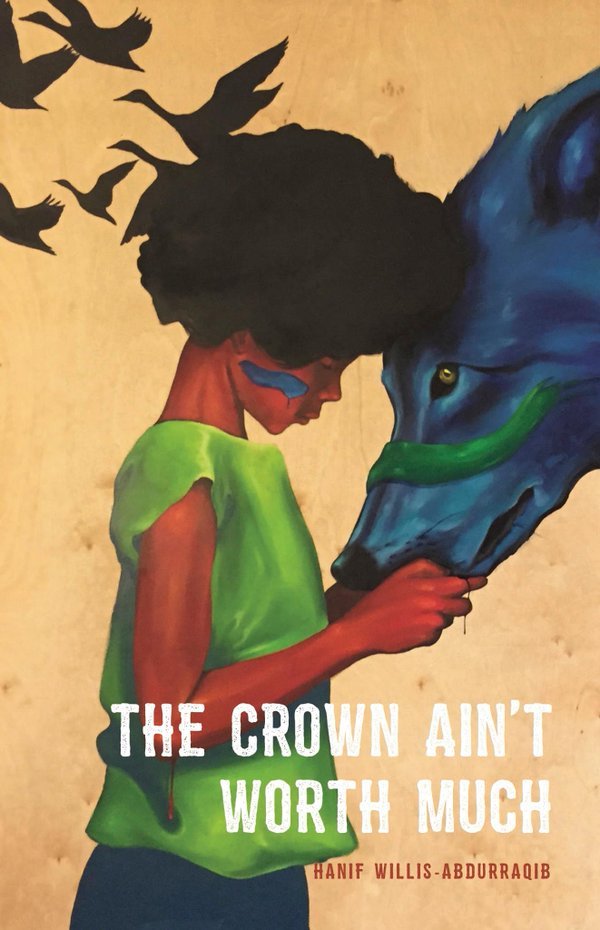
Graduate student Brennan Bestwick:
At the top of my summer reading list is Hanif Willis-Abdurraqib’s full-length debut, The Crown Ain’t Worth Much. Willis-Abdurraqib’s poems contemplate home and identity through the soundtracks that shape our histories. Some of my favorite poems by him include “The Summer A Tribe Called Quest Broke Up,” “Ode to Drake, Ending With Blood In A Field,” and “All The White Boys On The East Side Loved Larry Bird.” The influence of our investment in pop culture abounds throughout his work, yet each piece is deeply personal. He’s one of my favorite writers, and I could not be more excited for the summer release of his debut.
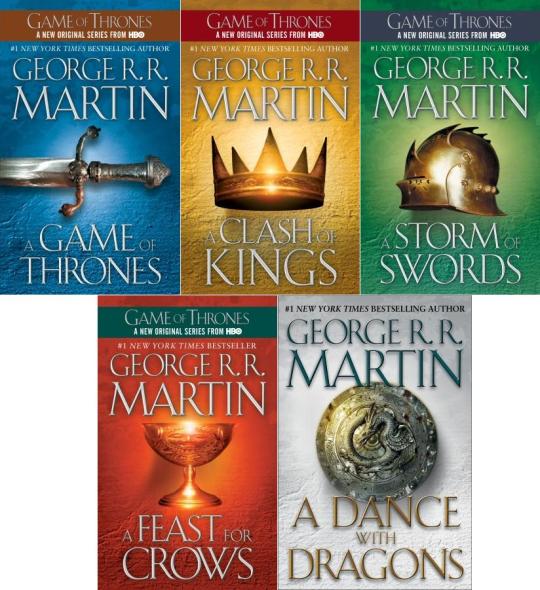
Graduate student Shelby Palmer:
This summer, I plan to revisit some old favorites—George R.R. Martin's A Song of Ice and Fire series, for starters—and to finish out a few book series that I've been working on, like City of Ember and I Am Number Four. I think about summer reading like eating food; yes, it's important to eat your vegetables, but every once in a while you need to have some candy.
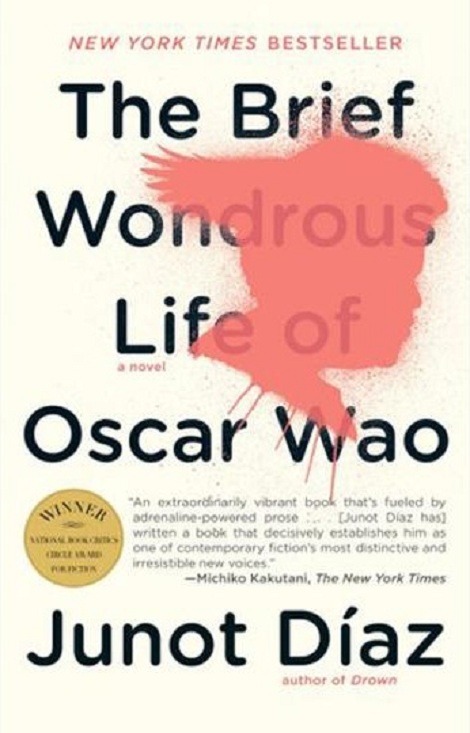
Undergraduate Katie Reininger:
Today I came forth from the recesses of The Dusty Bookshelf carrying a brown paper bag full of books that I intend to devour this summer (while I'm sitting under pine trees beside a clear, mountain spring). At the top of my reading list (alongside many poetry books) is Junot Diaz's The Brief Wondrous Life of Oscar Wao and Stephen King's Everything's Eventual.
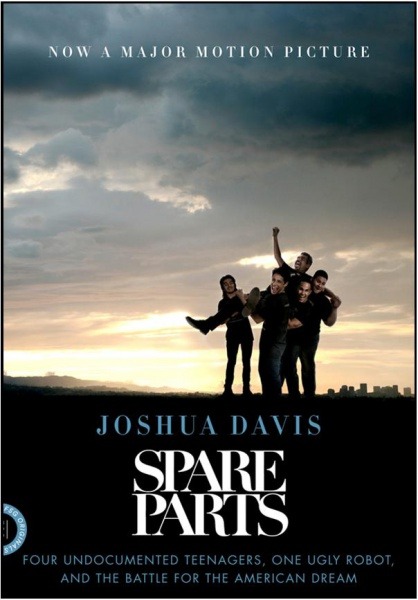
K-State First Learning Assistant Coordinator Carmen Schober:
Spare Parts by Joshua Davis is definitely at the top of my reading list (since it's next year's common read!), and Bel Canto by Ann Patchett is high up there, too. Her nonfiction is fantastic, so I'm excited to see what she does with a novel.
1 note
·
View note
Text
Literary editors discuss their work and their passion
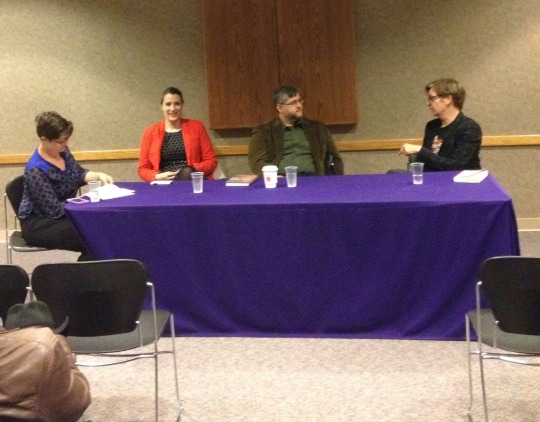
Last week, a panel of literary editors — (from left to right) moderator and K-State professor Traci Brimhall, Prairie Schooner’s Ashley Strosnider, Pleiades’ Phong Nguyen, and Tin House’s Rob Spillman — visited Kansas State to talk about editing, literary community, and their own creative work. Here are some reactions to the event from the K-State writing community.
Graduate student Dylan Pyles: When you’re conducting an interview with Rob Spillman, who edits one of the biggest literary magazines in the United States, and he reveals his general distaste for short stories that feature a second-person narrator, you’ll reconsider your entire approach to the second-person story you’ve been devoting large amounts of time to for nearly six months. “Maybe he’s right,” you’ll think, slouching in your chair as if he can see ill-fated attempts at narrative experimentation written on your face. However, when he follows that initial comment by noting that he hopes to be surprised and even proven wrong in his editing practices, you’ll add “Prove this guy wrong” to your writing goals and experience a sudden spark of rebellion. Furthermore, when he tells you that his coeditors often purposefully seek out second-person stories in hopes of proving him wrong, you’ll have the sudden urge to end the interview and get to work because the thing that you thought was holding you back might be the very thing that propels you forward.
Graduate student Brennan Bestwick: As writers we often find ourselves engrossed in our own material, but it’s also important to consider how we’re aiding one another. Part of this process is creating spaces for diverse voices. Rob Spillman referred to this community as an ecosystem. We need to push one another up when needed. The editors all detailed the ways in which their journals strive to publish more women, writers of color, LGBTQ authors, and artists too often overlooked in the world of literature. It’s also necessary to think about the cities and environments we call home and consider how we’re supporting and promoting art in these spaces, too. Since hearing from Phong, Ashley, and Rob, I’ve been thinking further about what I’m doing for writers other than myself. I plan to challenge myself to do more as an advocate for art and literature.
Undergraduate Anna Meyer: From colossal slush piles to interminable conference calls to Virginia Woolfing, all three panelists mentioned their careful yet frazzled balances of time, energy, and creativity. Sometimes editing and publishing could seep into their personal writing time, but they all agreed that they still love it. They have fun. They expand and explore. They discover new authors and works to share with the ever-growing literary community. I appreciate the value each of the panelists emphasized in publishing not just the well-knowns, but the innovative up-and-comers because their work is just so damn good. And, still, they’re always creating. So yeah, while at first I imagined writing and editing came from the same jar, I quickly revamped. There’s a big difference between pumpkin soup and pumpkin pie, but the visiting writer-editors reminded me that I can (and should) save room for dessert.
Undergraduate Alyssa Haynes: As a new writer, it was a relief to have someone tell me the ins and outs of editing and publishing. It’s frightening to think about the writing world and to imagine you belong in it. To hear these editors speak about their work and how they weed through the publishing world helped ground the idea that maybe one day I could be published. However, the highlight of the night was at the reception. I was talking to Phong about moving to Boston, and as he offered me some advice on how to assimilate into the writing community there, he casually mentioned that he is close friends with Monique Truong. Yes, my favorite author, Monique Truong. I gushed about how much I loved her novels, her writing style, just her in general, and he made a promise to let her know that she had a huge fangirl in Kansas. That felt amazing.
Graduate student Adena Weiser: I liked how each editor presented distinct work: Rob Spillman read from his memoir, All Tomorrow’s Parties; Phong Nguyen read an excerpt from his short story collection, Pages from the Textbook of Alternate History; and Ashley Strosnider read a short story from her mobile phone—one that was published online. I enjoyed talking with them, discovering how versatile each writer was, and how they found their own writing process.
Undergraduate Katie Reininger: Before I sat down to dinner with some of the biggest names in the editing community, I was nervous. These people made a living by deciding the fate of young writers. Yet, throughout the night, these three fantastic people showed me a glimpse of my future. They taught us that If we become writers, we will be cool—our future selves will be fashionable, witty, and go on crazy adventures (like attending a rave under the Berlin Wall). Our future selves will give great advice and will be a young writer's biggest support system. We will have connections, friends, and workshop groups all over the world. If we pursue a life of being a writer or journal editor, we will seek out a life of creating and joining together communities bigger than ourselves. To get there, they told us to take risks and write about what it's like to be alive in the world today. They want to see us tackle social issues that matter, write about what excites us, and watch us succeed. By getting the opportunity to interact with these editors, I was reminded of why we write endless essays, short stories, poems, and research papers—we write to become writers, and that's a special opportunity worth the risks and effort.
0 notes
Text
Discussions of home with Julian Hoffman
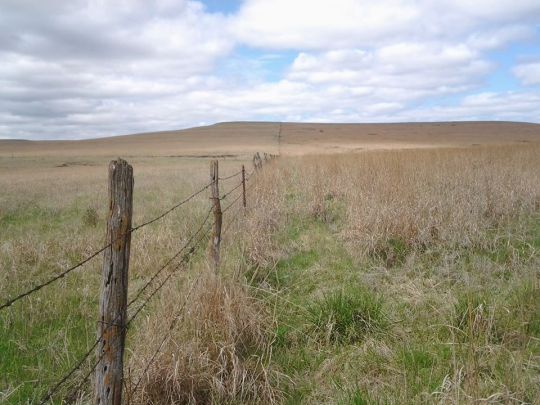
During his visit to Kansas State University, visiting writer Julian Hoffman stayed out at, hiked around, and took photographs (such as this one) of the Konza Prairie.
By Jordan Thomas
While preparing to meet visiting author Julian Hoffman, I didn’t know what sort of man to look for. I knew that he was of English origin, grew up in Canada, and lived in the wilderness of northern Greece, but this eclectic batch of information did nothing to narrow the profile. Luckily, English instructor Chris Nelson found me first, so Julian knew who to approach when he rounded the corner into the English building entrance.
I immediately felt at ease with Julian. He had a north English accent and copious amounts of charm in spite of travel fatigue. Chris, Julian, and I walked to the Leadership Studies building for lunch.
I had been slightly nervous about this. I’m not an English major; I study anthropology and am working with the English department to write my Honors thesis on research I conducted with a Pueblo Native American community in New Mexico. Every department and major has their own unique jargon and interests, so I thought that I might end up being an outsider.
As we ate outside, however, I realized my worries couldn’t have been farther from the truth. We quickly found common ground in our interests in writing, travel, and the natural world. Julian described his journey from Canada to London and the personal circumstances that led him to move to a small stone village beside a lake in the mountains of Greece. He has lived there for sixteen years. I told him about my travels through Latin America, my interest in food systems research, and the graduate school I will soon attend near Julian’s home town in England.
Julian helped to ground my aspirations to become a writer. In Greece, he had run a sustainable farm with his wife. They sold to local markets and restaurants, and eventually distributed their produce as far as Athens. One year he hurt his back, however, and decided that his body was telling him to find a new career. He devoted himself to writing books.
Julian emphasized that writing books to make money is essentially fruitless. He writes books because he feels that he must, like a deep impulse. He described the process of gaining contracts, getting published, and touring with his books. He generally doesn’t have funding for book tours; most people don’t, but he thinks the experience is worth it. He gains great fulfillment from discussing his books with readers.
Julian was preparing for a reading and discussion session that evening, and I found myself in a strange dilemma of spring intramural season. Should I attend Julian’s reading or play softball with my friends? I described the problem to Julian, and he laughed, telling me that he came all the way from Greece for this. A few minutes later, sipping a beer at a bar, I gained the opinion of my friends. They thought I would be crazy to skip Julian’s reading to play softball. I agreed.
When I attended his reading later that evening, I gained a sense of the fulfillment Julian had described earlier. The audience listened and watched intently as Julian triangulated photos from his home, excerpts from his books, and natural commentary. What we gained was an intimate sense for Julian’s reflections on place, self, and home, and how these concepts are found, maintained, and change through life. We journeyed with him in his wanderings through valleys, watched with him as a heron and a snake contended in a dance for life, and felt with him as he situated the land within the political and economic struggles facing his region.
As the evening ended, I felt that my life was enriched. Sometimes when you read books such as Julian’s, in which the prose flows like poetry, it’s hard to imagine the person behind the words. After hours with Julian, I was inspired by his personality, which was peaceful yet real, funny, and engaged. I left the reading feeling that if a man as real as Julian can be fulfilled by transforming such artful reflections into books, maybe there is a chance for young writers like me.
Jordan Thomas is a senior at Kansas State University.
0 notes
Text
Imposter Syndrome – Do You Really Belong at AWP?
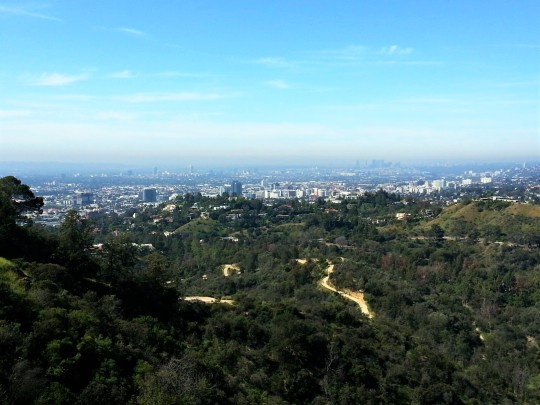
The 2016 AWP Conference was in beautiful LA. (Photo by Carmen Schober)
By Carmen Schober
This was my second time attending the AWP Conference, this year in the bustling, beautiful city of Los Angeles, and it was everything I dreamed it would be, aside from not achieving Bucket List Item #117 – Casually Bump into Sylvester Stallone and Become Friends.
Oh well. Next time.
This year was a vast improvement from the last, when I was more than a little overwhelmed. (In case it’s not coming across in all the other posts about AWP – it’s a big-ass conference.) This time, though, you should’ve seen me, walking around the giant convention center all confident and smiley and mostly knowing where I was going.
I paneled.
I networked.
I bought books and magazines and collected temporary tattoos for my niece.
It was the best of times.
But towards the end of the conference (when I got more reflective), my confidence waned, and I felt a little less sure of myself. Why? Because Internal-Voice-Carmen was all like, “Why are we even here? This conference is for real writers, not a wannabe loser with a small-time blog, and unpublished short stories, and an unfinished novel. Go home!”
I know what you’re thinking, and you’re right — Internal-Voice-Carmen can be a real bitch sometimes. But it’s just because she gets insecure. She’s scared that she might not have what it takes to be a “real” writer.
Imposter Syndrome — basically defined as insecurity over some aspect of one’s identity and an irrational fear of being exposed as a fake — is a real thing. Look it up, folks. Even AWP knows this, so they created a panel about it for us self-conscious conference-goers (that, sadly, I couldn’t attend. I did highlight it, though on my schedule.)
Some imposter-y questions that crossed my mind during the conference:
Am I too young? Maybe I’m too innocent and naïve and not worldly-wise enough to be a writer. Everyone around me is like 30+ and with five degrees and three published books, and they know more about everything than I do. (Which totally wasn’t true by the way — there were lots of young, unpublished students and writers — but Imposter Syndrome distorts reality.)
Am I literary enough? I don’t usually think about this (because trying to be literary is so damn exhausting), but when featured writers are reading stuff I can barely understand and/or don’t like, and people are acting like they get it and love it and it’s the best thing ever, it does make you wonder if you’re missing something. (And maybe they really do get it/love it — but maybe they just feel like they should. Or maybe they’re being polite. Or maybe they just aren’t your audience. There’s lots of possibilities, but Imposter Syndrome insists that you’re just not sophisticated enough to hang.)
Am I hipster enough? Through the distorted lens of Imposter Syndrome, everyone at AWP is super edgy and strange and pushing the boundaries of something — and I’m over here in the corner, trying to write contemporary romance and feeling oh so Midwestern and cute and not so cutting edge. Even worse, I don’t have any cool tattoos or remarkable piercings. I don’t even like the taste of beer. That jerk Imposter Syndrome says, “What a dweeb. Real writers are cool.”
Am I too delusional? The general tenor at AWP is pretty practical and realistic. For the most part, the writers doling out advice are reasonable about their writing goals and encourage others to be the same. I get where they’re coming from (and suspect they’re probably right), but an unshakeable part of me believes I can do things that, realistically, I probably can’t (like one-armed pushups or writing a novel that loads of people want to read.) And, like Journey advises, I don’t stop believing. That could be my edge — or, Imposter Syndrome says, that’s just my naiveté shining through.
Am I even a “real” writer? This one cuts deep when you’re meeting writer after writer after writer with long lists of publications. My publications? Basically zero (I say “basically” because you could possibly count my little Weekend Collective listicles and personal blog posts as publications if you’re feeling generous.) Do I write? Hell yeah I write. But am I a Writer, emphasis on that capital letter? Nope, Imposter Syndrome assures me. I’m not.
Isn’t Imposter Syndrome such a bully? Don’t worry, though — I mostly managed to quash my doubts with a little self-reflection, a tirelessly encouraging husband, a strong bikinitini, and, of course, a little writing.
My final questions for you:
Are you young? Or not so young? Is what you write uber “literary” or not so much? Are you unpublished? A little delusional? Only a moderate hipster?
Depending on your answers, you may not fit in with everyone at AWP — but you certainly won’t be an imposter. When it’s all said and done, those questions aren’t so important.
Just two questions should probably be on your mind:
1. Do you write? Like really write? You don’t just think/talk about it — you actually do it, and you do it often?
And, lastly —
2. Do you love writing? You know what love feels like, so think about it, and respond accordingly.
If you answered yes and yes, congratulations, friend. You’re a writer (screw the capital letter.) And AWP is where you belong.
Carmen Schober is the Learning Assistant Coordinator for K-State First, but she used to haunt the halls of the Kansas State English Department, where she earned her BA and MA in English Literature and Creative Writing. In her spare time (when she’s not coordinating or writing), she travels, plants cacti and onions, and writes snappy bios in the third person.
3 notes
·
View notes
Text
Five First-Time Tales of Attending AWP
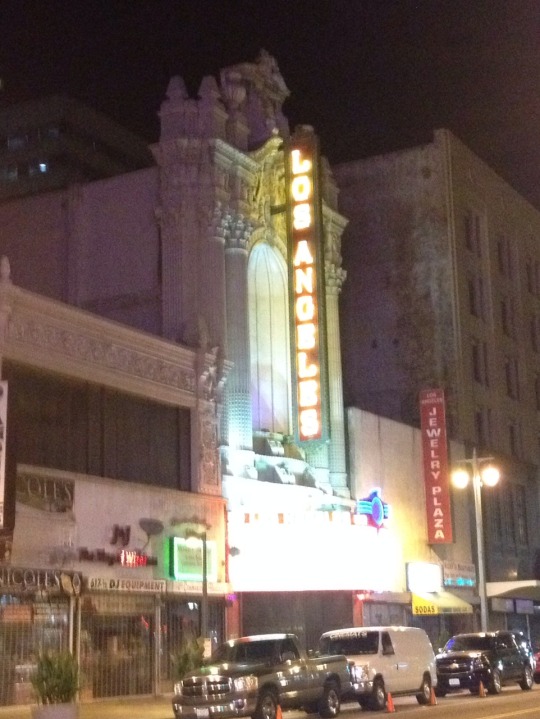
Grad student Robert Sanders: We rolled the rental “murder van” down the San Gabriel mountains heading into Los Angeles after 24 hours on the road. I’d slept, maybe, an hour in the passenger seat. We weaved in and out of traffic taking every advantage of the carpool lane. Its diamond, our trail blaze. Motorcycles split lanes at speeds that shocked out sleep deprived minds. After some diner food we made for the conference itself. Thursday night. Claudia Rankine would speak on race in pedagogy. But the morning was for first impressions and registration lines. As I Iooked through the seat-belt-roped-off cattle chutes in the musty halls of the LA Convention Center, a thought occurred to me: perhaps I am not consciously eccentric enough to be a writer, to be at AWP. I didn’t have a top hat, or a fedora with a peacock feather. I don’t wear shorts with different color tube socks to my knees, nor do I have a necklace whose pendant is the sun bleached vertebra of a deer. Just scuffed boots, and a solid green t-shirt with a pocket. Imposter syndrome, you might think. They had a panel on how to overcome it at AWP, but we arrived too late to see it. I went to find a sense of community with new writers from all over the country. I wanted to make connections—network. Shake hands with someone who would publish me or at least remember my name. I shook hands with grad students from other programs. Each one was kind; each would shake 3,000 hands that weekend. While the cynic in me wants to write off some of the experience, I have found that it drew me closer to the writers that I’d already known. And there is value in that.
Undergraduate Anna Meyer: As a first-time LA visitor and AWPer, I prepared a detailed itinerary. I wrote down every panel, every meal, even the miles and minutes between each location. But like any new adventure, you rarely follow a schedule perfectly. During AWP, I found a large community of writers, publishers, and literary lovers who—get this—actually cared, were even excited to exchange thoughts with me about MFAs, books, and the writer’s life. What a wonderful experience to find comfort in a gigantic pool of unfamiliars. The most thought-provoking event for me was Claudia Rankine’s conference speech. She directly addressed the overwhelmingly white power in the literary world, not just in MFAs, agencies, and publishing houses, but also in our own literary imagination. As a Hyphen-American, I’m not sure where I stand. Growing up here, I’ve adopted American customs and social expectations, but I’m from China. I’m not completely othered, but I’m not totally included. How do I find an identity in the literary world when both sides could invalidate me? I have time to ponder this more, but I’m grateful for this entire experience, and I hope to have more opportunities like this in the future. Until then, I will continue to explore, to question, to create.
Grad student Kira Frank: Even using the term “genre fiction” makes me bristle. As an aspiring speculative fiction writer, I’ve felt the pressure to write fiction that adheres to reality. One perk of working on my writing at K-State is the lack of said pressure—I’m free to write what I want. I won’t lie; I was nervous at AWP to confront MFA programs with my current project, a short tale that draws heavily from Frankenstein. My fears diminished when I heard Kelly Link read with a panel of amazing female speculative authors. From the apocalypse to Ouija board experiments to surrealist interpretations of the 2011 tsunami, speculative fiction was represented in all of its strange glory. The next day, I saw Kelly Link with another set of amazing female authors discussing the banality of the age-old question: how do we label different genres? Where does speculative fiction fall in relation to historical fiction in relation to literary fiction? Pointless questions really. Instead, we as writers should consider what constitutes good fiction. How can we write what we want as well as we can? I’m sure some will disagree with me. The argument of where speculative fiction belongs will continue for as long as fiction exists, but it’s nice to know there’s a spot for those who write it at AWP, and back home in Kansas.
Grad student Chris Sheffer: I came to AWP with a hunger that I didn’t recognize until someone sat down and read me poetry. I came to graduate school with a love for poetry, but for the past year, I have found myself writing nothing but prose. Upon perusing AWP’s schedule of events and reviewing the various writing panels, I saw an opportunity to ignite coals, all but lifeless, that I have kept around simply for nostalgia’s sake, out of respect for the fire that once fed my every word. As it turns out, the poetry panels at AWP were exactly what I needed to rejuvenate my writing. Most notably, I attended a panel on serial poetry where the presenters read poems that made me want more. It was then that I recognized the return of my once-insatiable poetic appetite. I serendipitously encountered one of the presenters, whose work I especially admired, while exploring the conference book fair. I was able to purchase one of his books: precious rations to prevent another poetic death by starvation. For his part, he has agreed to serve as a publishing connection: a guide to tell me where to send my poems, perhaps saving me hours of research and years of rejection. I would recommend AWP to anyone at any point in their writing career. Sometimes, all you need is a reminder of why you write and a real estate agent to find your words the homes that they deserve.
Grad student Hunter Gilson: A trip to any academic conference takes a serious amount of planning, so thank you to everyone involved in planning our AWP experience. Planning, however, is only half the battle (or maybe a quarter, or maybe an even smaller percentage). A trip to an academic conference can really only happen if funds are available to make it feasible for students to attend. Thankfully, Touchstone and CreWE are lucky enough to have a department and university that are willing to help cover a bulk of this cost. As always and for everything, thank you to our superstar department head, Dr. Karin Westman. Thank you also to the English Department's office staff, Leanna Oxios and Peggie Post, who were willing to battle with to an unnamed rental car company to help make four graduate students' dream of driving the I-70 corridor from the Little Apple to Los Angeles a harrowing reality. Another large thanks goes out to the Student Governing Association that allotted additional funding that allowed several of our students to attend relatively free of cost. Thanks too should be given to those who volunteered on behalf of Touchstone and CreWE. Your time moving file boxes paid off! Because of you, four graduate students and two undergraduate students were able to attend the most important writing conference in the land. That's a pretty remarkable thing and—to my knowledge—a group that large is a first for our program. Thank you all. And finally, thank you to all of the AWP attendees from the English Department. Thank you for suffering through my fourteen-some-odd email chains—yes, I counted—about hotel lodging and other logistical concerns. But now on to me. Thank you to the College of Arts and Sciences for providing a travel grant that allowed me to conduct interviews at AWP with three truly remarkable writers. (Seriously, all of you readers should check out their work, as in now. I can give you recommendations on where to start.) Thank you to Elena Passarello, Tom Franklin, and Irina Reyn. Having the chance to interview each of you was the highlight of my year. I'm so excited to share those conversations on the forthcoming K-State Creative Writing Podcast.
3 notes
·
View notes